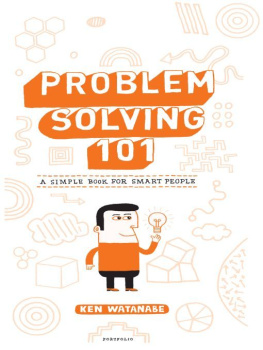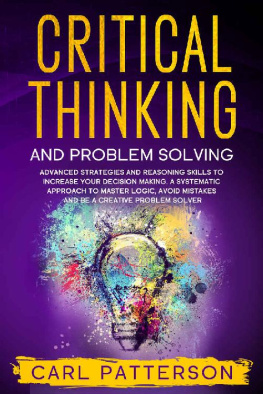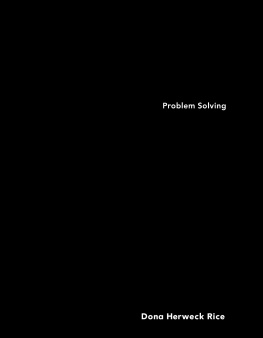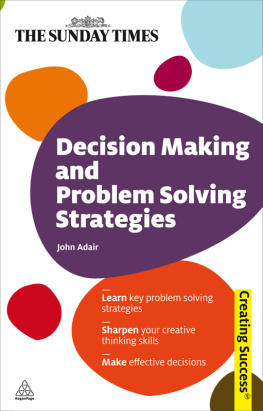Table of Contents
PORTFOLIO
Published by the Penguin Group
Penguin Group (USA) Inc., 375 Hudson Street, New York, New York 10014, U.S.A. Penguin Group (Canada), 90 Eglinton Avenue East, Suite 700, Toronto, Ontario, Canada M4P 2Y3 (a division of Pearson Penguin Canada Inc.) Penguin Books Ltd, 80 Strand, London WC2R 0RL, England Penguin Ireland, 25 St. Stephens Green, Dublin 2, Ireland (a division of Penguin Books Ltd) Penguin Books Australia Ltd, 250 Camberwell Road, Camberwell, Victoria 3124, Australia (a division of Pearson Australia Group Pty Ltd) Penguin Books India Pvt Ltd, 11 Community Centre, Panchsheel Park, New Delhi - 110 017, India Penguin Group (NZ), 67 Apollo Drive, Rosedale, North Shore 0632, New Zealand (a division of Pearson New Zealand Ltd) Penguin Books (South Africa) (Pty) Ltd, 24 Sturdee Avenue, Rosebank, Johannesburg 2196, South Africa
Penguin Books Ltd, Registered Offices:
80 Strand, London WC2R 0RL, England
First published in 2009 by Portfolio,
a member of Penguin Group (USA) Inc.
Copyright Kensuke Watanabe, 2007, 2009
All rights reserved
Originally published in Japanese by Diamond Inc., Osaka.
Illustrations by Allan Sanders
LIBRARY OF CONGRESS CATALOGING IN PUBLICATION DATA
Watanabe, Ken.
Problem solving 101 : a simple book for smart people / Ken Watanabe. p. cm.
eISBN : 978-1-101-02848-3
Without limiting the rights under copyright reserved above, no part of this publication may be reproduced, stored in or introduced into a retrieval system, or transmitted, in any form or by any means (electronic, mechanical, photocopying, recording or otherwise), without the prior written permission of both the copyright owner and the above publisher of this book.
The scanning, uploading, and distribution of this book via the Internet or via any other means without the permission of the publisher is illegal and punishable by law. Please purchase only authorized electronic editions and do not participate in or encourage electronic piracy of copyrightable materials. Your support of the authors rights is appreciated.
http://us.penguingroup.com
what is your delta?
PREFACE
WHY PROBLEM SOLVING?
We all have to make decisions. Whether youre a student, a parent, a businessperson, or the president of the United States, you face problems every day that need solving. The problems may vary. Maybe you need to pass a math class, or decide where to live, or figure out how to improve your companys bottom line. Maybe you want to lose some weight or simply get better at golf.
Whether the issue is big or small, we all set goals for ourselves, face challenges, and strive to overcome them. Theres a fundamental approach to solving these real-life problems, one that can consistently lead you to effective and satisfying solutions. And chances are, no one has ever bothered to show you how.
One of my missions in writing this book was to show everyone a simple way to deal with the problems they face in their everyday lives. But I wasnt just trying to communicate a skill set. Being a problem solver isnt just an ability; its a whole mind-set, one that drives people to bring out the best in themselves and to shape the world in a positive way. Rather than accepting the status quo, true problem solvers are constantly trying to proactively shape their environment. Imagine how different our world would be if leaders like Mahatma Gandhi, Martin Luther King Jr., Eleanor Roosevelt, JFK, and Steve Jobs lacked this attitude.
I hope this book will help inspire both children and adults to develop this proactive mind-set by first tackling the problems in their own lives. Once you learn this simple way to solve the personal challenges you face every day, you just might see that your bigger dreams and accomplishments are also within your reach.
WHY I WROTE THIS BOOK
Before I wrote this book, I was a consultant for the global management consulting firm of McKinsey & Company. For six years I worked with major companies all over the world to help solve their business challenges using a straightforward yet powerful set of problem-solving tools.
These are tools that anyone can use. They dont require complicated computer software or a room full of expert analysts. Theyre simply approaches to broaden and organize ones thinking about a problem, so that more possible solutions become clear.
In 2007 Japans prime minister made education his nations top agenda. As the country turned its focus to the educational system, I felt compelled to do my part. Although Japanese business leaders, educators, and politicians have long talked about the need for Japan to shift from memorization-focused education to problem-solving-focused education, no one had figured out a concrete and effective way to make this happen.
So I left McKinsey to write this book and to teach kids. My aim was to teach Japanese children how to think like problem solvers, to take a proactive role in their own education and in shaping their lives. I tried to frame the tools we used at McKinsey in a fun and approachable way, one that would show kids what a practical approach to problem solving could help them accomplish. Although I dont claim to be any kind of expert on education, I hoped that the book would at least provide a starting point, one that would help shift the debate from whether we should teach problem solving to how we should go about teaching it.
Then a surprising thing happened: The book took offand not just with kids. It first caught fire in the business segment, becoming Japans number one business best-seller in 2007. Then it spread through the education community and to a wider general audience. It turned out that adult readers in Japan, from parents and teachers to CEOs of major corporations, had been craving a simple and useful guide to problem-solving techniques.
Now Im focusing on helping kids put Problem Solving 101 into practice. I think the experience kids get from having an idea, taking initiative, and learning from both their successes and their failures is what we have to put more emphasis on. So Im creating more opportunities for them to learn more from real-life situations rather than just in the classroom.
When I work with kids, I dont start by teaching the skills from Problem Solving 101 in a classroom. Instead, I let them learn the same way Warren Buffett did. Buffett got his first business experience when he was only six years old, buying Coke bottles from his grandfathers store and selling them for a profit. The kids I work with get to run a food and drink business using a 1965 VW van Ive renovated for use as a transportable shop. The kids decide what food and drinks to sell, where to sell, and how to compete against other teams by actually selling what they have cooked or prepared. The kids learn the importance of not just problem solving skills, but also leadership, teamwork, creativity, persistence, charm, and kaizen (continuous improvement) to make their vision come true. Only after this experience do I help them ask the important questions and provide them with the problem-solving tools that could help them with future projects.
The value of problem-solving-oriented thinking obviously extends far beyond the classroom into every facet of our lives. It enables us to take control of the challenges we encounter and to change the world in a positive way. My hope is that English-reading audiences will benefit from the book in the same way many Japanese readers have.











